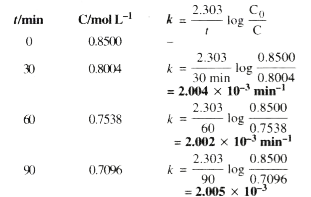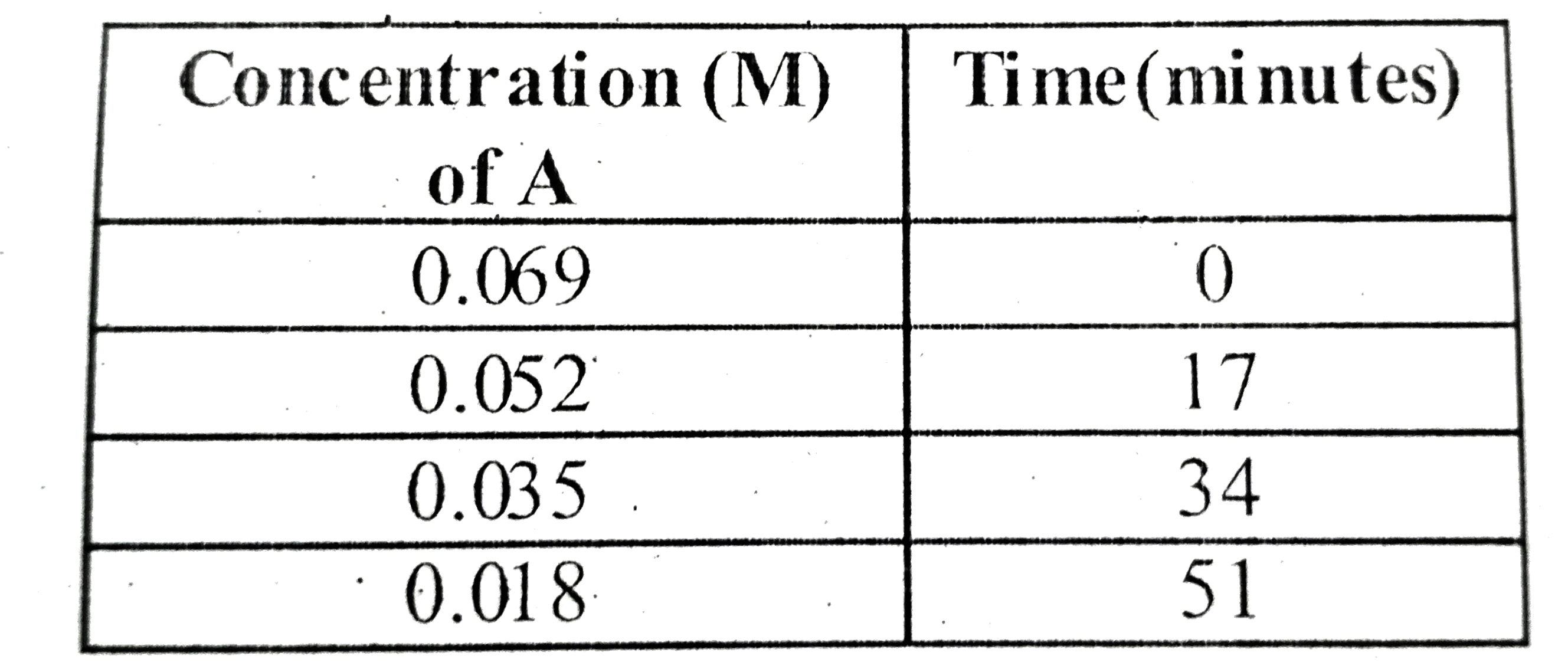Hydrolysis of methyl acetate in aqueous solution has been studied by titrating the liberated acetic acid against sodium hydroxide. The concentration of the ester at different times is given below:
![Hydrolysis of methyl acetate in aqueous solution has been studied by titrating the liberated acetic acid against sodium hydroxide. The concentration of the ester at different times is given below: Show that it follows a pseudo first order reaction, as the concentration of water remains nearly constant (55 mol L^(-1)) during the course of the reaction. What is the value of k'in this equation? Rate =k'[CH3 COOCH3][H2 O]](https://d10lpgp6xz60nq.cloudfront.net/physics_images/KAL_KLC_ISC_CHE_XII_C04_SLV_087_Q01.png)
Show that it follows a pseudo first order reaction, as the concentration of water remains nearly constant (55 mol L−1) during the course of the reaction. What is the value of k'in this equation? Rate =k'[CH3COOCH3][H2O]
The correct Answer is:k=3.64×10−5mol−1Lmin−1
For pseudo first order reaction, reaction should be first order with respect to ester when the conc. of water is practically constant. The rate constant for pseudo first order reactions is given by
k=2.303tlogC0C where k=k.[H2O]
From the given data :

As k[H2O] is constant , the reaction is a pseudo first order reaction
Now k[H2O]=k[55molL−1]=2.004×10−3min−1
∴k.2.004×10−3min−155molL−1
=3.64x10−5mol−1Lmin−1
Topper's Solved these Questions
- CHEMICAL KINETICSBOOK - ICSECHAPTER - CHEMICAL KINETICSEXERCISE - INTEXT QUESRTIONS
81 Videos
- CHEMICAL KINETICSBOOK - ICSECHAPTER - CHEMICAL KINETICSEXERCISE - EXERCISE (PART- I (OBJECTIVE QUESRTIONS)A.FILL IN THE BLANKS)
54 Videos
- CHEMICAL KINETICSBOOK - ICSECHAPTER - CHEMICAL KINETICSEXERCISE - ISC EXAMINATION QUESTIONS (NUMERICAL PROBLEMS )
57 Videos
- BIOMOLECULESBOOK - ICSECHAPTER - BIOMOLECULESEXERCISE - ISC EXAMINATION QUSTIONS (PART-I)(DESCRIPTIVE QUESTIONS)
21 Videos
- CHEMISTRY IN EVERYDAY LIFEBOOK - ICSECHAPTER - CHEMISTRY IN EVERYDAY LIFEEXERCISE - EXERCISE (PART - II (DESCRIPTIVE QUESTIONS) (LONG ANSWER QUESTIONS))
19 Videos
Similar Questions
The hydrolyiss of methyl acetate in aqueous solution is has been studied by titrating the liberated acetic acid against NaOH. The concentration of ester at different times is given below:
∣∣∣t (min)0306090C(MolL−1)0.85000.80040.75380.7096∣∣∣
Show that it follows a pseudo first order reaction, as the concentration of water remains nearly constant (55molL−1) during the course of the reaction . What is the value of k' in the equation ?
Rate =k'[CH3COOCH3][H2O]
View SolutionThe hydrolyiss of methyl acetate in aqueous solution is has been studied by titrating the liberated acetic acid against NaOH. The concentration of ester at different times is given below:
∣∣∣t (min)0306090C(MolL−1)0.85000.80040.75380.7096∣∣∣
Show that it follows a pseudo first order reaction, as the concentration of water remains nearly constant (55molL−1) during the course of the reaction . What is the value of k' in the equation ?
Rate =k'[CH3COOCH3][H2O]
View Solution
Knowledge Check
Assertion (A): Hydrolysis of an ester follows first order kinetics.
Reason (R): Concentration of water remains nearly constant during the course of the reaction.ABoth A and R are true and R is the correct explanation for ABBoth A and R are true but R is NOT the correct explanation of ACA is true but R is falseDA is false and R is trueAssertion (A) : Hydrolysis of an ester follows first order kinetics.
Reason (R ) : Concentration of water remains nearly constant during the course of the reaction.ABoth Assertion (A) and Reason (R) are correct statements, and Reason (R) is the correct explanation of the Assertion (A).BBoth Assertion (A) and Reason (R) are correct statements, but Reason (R) is not the correct explanation of the Assertion (A).CAssertion (A) is correct, but Reason (R) is incorrect statement.DAssertion (A) is incorrect, but Reason (R) is correct statement.The reaction of acetic acid and sodium hydroxide results in the formation of
Aacidic saltBbasic saltCneutral saltDnone of these
The hydrolyiss of methyl acetate in aqueous solution is has been studied by titrating the liberated acetic acid against NaOH. The concentration of ester at different times is given below:
∣∣∣t (min)0306090C(MolL−1)0.85000.80040.75380.7096∣∣∣
Show that it follows a pseudo first order reaction, as the concentration of water remains nearly constant (55molL−1) during the course of the reaction . What is the value of k' in the equation ?
Rate =k'[CH3COOCH3][H2O]
View SolutionFor the hydrolysis of methyl acetate in aqueous solution, the following results were obtained,

a) Shat that it follows pseudo first order reaction, as the concentration of water remains constant.
b) Calcualte the average rate of reaction between the time interval 30 to 60 seconds.
View SolutionThe concentrations of the reactant A in the reaction A →B at different times are given below:

The rate constant of the reaction according to the correct order of reaction is :
View SolutionIn a first order reaction, the concentration of reactant decrease from 400 mol L−1 to 25 mol L−1 in 200 seconds. The rate constant for the reaction is
View SolutionIn a first order reaction, the concentration of reactant decrease from 400 mol L−1 to 25 mol L−1 in 200 seconds. The rate constant for the reaction is
View Solution
